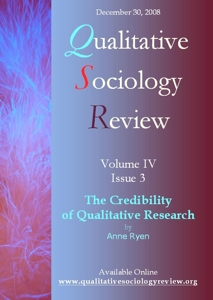Who Allowed You To Observe? A Reflexive Overt Organizational Ethnography
DOI:
https://doi.org/10.18778/1733-8077.4.3.03Keywords:
Ethnography, Reflexivity, Organization, Work, EpistemologyAbstract
Observing people working within organizational contexts through time creates epistemological issues, more so when doing it overtly, with top management’s official agreement. Power relations as well as hierarchical structures strongly influence the way people view the observer and interact with her in organizations. Those interactions also partly depend on his personal background – sex, age, professional position and so on. Following a reflexive approach, my objective is here to better grasp how top management’s agreement to the ethnographer’s entry on the field may influence both the way workers from differing hierarchical levels behave with her (and thus affect her observing conditions) and how he may analyse his ethnographic notes to develop scientific sociological results.
Downloads
References
Atkinson, Paul and Hammersley, Martyn (1995/1983) Ethnography. Principles in Practice. New York: Routledge.
Google Scholar
Bazsanger, Isabelle and Nicolas Dodier (1997) “Totalisation et altérité dans l’enquête ethnographique.” Revue française de sociologie 38:37-66.
Google Scholar
DOI: https://doi.org/10.2307/3322372
Barley, Stephen R. (1990) “Images of Imaging: Notes on Doing Longitudinal Field Work.” Organization Science 1:220-247.
Google Scholar
DOI: https://doi.org/10.1287/orsc.1.3.220
Bate, Paul S. (1997) “Whatever Happened to Organizational Anthropology? A Review of the Field of Organizational Ethnography and Anthropological Studies.” Human Relations 50 (9):147-1175.
Google Scholar
DOI: https://doi.org/10.1177/001872679705000905
Becker Howard S. (1970) Sociological Work: Method and Substance. Chicago: Aldine.
Google Scholar
Bloch, Marc (1997 (1949)) Apologie pour l’histoire ou Métier d’historien. Paris: Armand Colin.
Google Scholar
Burawoy, Michael B. (1998) “The Extended Case Method”. Sociological Theory 16 (1):4-33.
Google Scholar
DOI: https://doi.org/10.1111/0735-2751.00040
Burawoy, Michael B. (2003) “Revisits: An Outline of a Theory of Reflexive Ethnography.” American Sociological Review 68 (5):645-678.
Google Scholar
DOI: https://doi.org/10.2307/1519757
Burawoy, Michael B. (2007a) Femmes du jazz. Musicalités, féminités, marginalisations. Paris: CNRS Editions.
Google Scholar
Burawoy, Michael B. (2007b) “Contributions of Ethnography to Gendered Sociology: the French Jazz World.” Qualitative Sociology Review III (3): 46-58. Special issue “Ethnographies of Artistic Work” edited by Becker Howard S. and Buscatto
Google Scholar
DOI: https://doi.org/10.18778/1733-8077.3.3.04
Marie.
Google Scholar
Burawoy, Michael B. (2002) “Des managers à la marge : la stigmatisation d’une hiérarchie intermédiaire.” Revue française de sociologie 43 (1):73-98.
Google Scholar
DOI: https://doi.org/10.2307/3322680
Burawoy, Michael B. (2001) “La relation d’emploi à l’ombre du chômage. Le cas de deux sociétés privées de service.” Travail et Emploi 87:67-79.
Google Scholar
Callon, Michel (1986) “Eléments pour une sociologie de la traduction. La domestication des coquilles Saint Jacques et des marins-pêcheurs dans la baie de Saint-Brieuc.” L’Année Sociologique 36:169-208.
Google Scholar
Dalton Melville (1959) Men who manage. Fusions of feeling and theory in administration. New York: John Wiley and sons.
Google Scholar
Dubet, François (1994) “Vraisemblance : entre les sociologues et les acteurs.” L’Année Sociologique 44:83-108.
Google Scholar
Elias, Norbert (1956) “Problems of involvement and detachment.” The British Journal of Sociology 7(3):226-252.
Google Scholar
DOI: https://doi.org/10.2307/587994
Gaxie Daniel (1990) “Au-delà des apparences… Sur quelques problèmes de mesure des opinions.” Actes de la Recherche en Sciences Sociales 81-82:97-112.
Google Scholar
DOI: https://doi.org/10.3917/arss.p1990.81n1.0097
Glaser, Barney G. and Strauss, Anselm L. (1968) The Discovery of Grounded Theory. Strategies for Qualitative Research. London: Weindenfeld and Nicolson.
Google Scholar
DOI: https://doi.org/10.1097/00006199-196807000-00014
Goffman, Erving (1974) Frame Analysis. New York: Harper and Row.
Google Scholar
Hughes, Everett C. (1971) The Sociological Eye: Selected Papers on Work, Self and the Study of Society. Book 2, Chicago: Aldine.
Google Scholar
Knorr-Cetina, Karin (1996). “Le “souci de soi” ou les “tâtonnements” : ethnographie de l’empirie dans deux disciplines scientifiques.” Sociologie du travail 38(3):311-330.
Google Scholar
DOI: https://doi.org/10.3406/sotra.1996.2256
Le Noé Olivier (2002) “Apports et apories des statistiques sur la lecture. Formes de connaissance ou de reconnaissance de la lecture.” Sociétés et Représentations 14:249-273.
Google Scholar
DOI: https://doi.org/10.3917/sr.014.0249
Mauger, Gérard (1991) “Enquêter en milieu populaire.” Genèses 6:125-143.
Google Scholar
DOI: https://doi.org/10.3406/genes.1991.1096
Peneff, Jean (1988) “The observers observed: French survey researchers at work.” Social Problems 35:520-535.
Google Scholar
DOI: https://doi.org/10.2307/800613
Pinçon, Michel and Pinçon-Charlot, Monique (1997) Voyage en grande bourgeoisie. Journal d’enquête. Paris: PUF.
Google Scholar
Roy, Donald (1952) “Quota Restriction and Goldbricking in a Machine Shop.” The American Journal of Sociology LVII (5):427-442.
Google Scholar
DOI: https://doi.org/10.1086/221011
Rabinow, Paul (1977) “Reflections on Feldwork in Morocco.” Berkeley: University of California Press.
Google Scholar
Rosen, Michael (1991) “Coming to Terms with the Field: Understanding and Doing Organizational Ethnography.” Journal of Management Studies 28 (1):1-24.
Google Scholar
DOI: https://doi.org/10.1111/j.1467-6486.1991.tb00268.x
Schwartz, Olivier (1993) “L’empirisme irréductible. La fin de l’empirisme?.” Pp. 265-305 in Le Hobo. Sociologie du sans-abri. N. Anderson (1923). Paris: Nathan.
Google Scholar
Schwartzman, Helen B. (1993) Ethnography in Organizations. London: Sage Publications.
Google Scholar
DOI: https://doi.org/10.4135/9781412984119
Silverman David (2007) “Art and Artefact in Qualitative Research.” Improving the Quality of Qualitative Research Conference, The European Science Foundation, Kristiansand, Norway, June 25-27, 2007 (unpublished communication).
Google Scholar
Strauss, Anselm L. (1992) La Trame de la négociation. Sociologie qualitative et interactionnisme. Paris: L’Harmattan.
Google Scholar
Taylor, Stephanie (ed.) (2002) Ethnographic Research. A Reader. London: Sage Publications.
Google Scholar
Van Maanen, John (1979) “The Fact of Fiction in Organizational Ethnography.” Administrative Science Quaterly 24:539-550.
Google Scholar
DOI: https://doi.org/10.2307/2392360
Downloads
Published
How to Cite
Issue
Section
License

This work is licensed under a Creative Commons Attribution-NonCommercial-NoDerivatives 4.0 International License.











